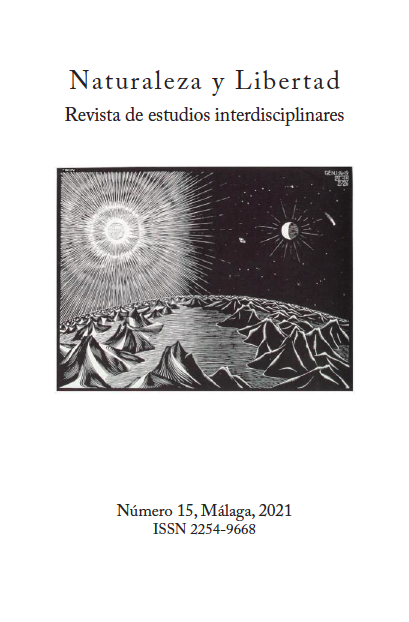The Animal that laughs
DOI:
https://doi.org/10.24310/NATyLIB.2021.vi15.12341Keywords:
laugh, animal laugh, human laugh, emotion, languageAbstract
This paper evaluates the similarities and, above all, the differences between animal «laughter» and human laughter, reflecting, based on contemporary science and philosophy, on an old Aristotelian thesis: that man is the animal that laughs.Downloads
Metrics
References
Aristóteles (2010) Obra biológica. Madrid: Luarna Ediciones.
Bates, M. (2017) «These Parrots Can Make Other Parrots 'Laugh'—a First», National Geographic, March, 20/2017
Berger, P. (1998) Risa redentora. La dimensión cómica de la experiencia humana. Barcelona: Kairós
Caruso, C. (2016) «Rats Enjoy Being Tickled--When They're in the Right Mood», Scientific American, 10/11/2016
Castro, Sixto J. (2014) Sobre la belleza y la risa. Ensayo de ontología estética. Salamanca: Editorial San Esteban.
Coren, S. (2009) «Do Dogs Laugh? Animals make laugh-like sounds when they are tickled or playing», psychologytoday.com, 22-11-2009.
Darwin, Ch. (1899) The Expression of the Emotions in Man and Animals. New York: D. Appleton and Company.
Davila Ross, M., Owren, Michael J., Zimmermann, E. (2009) «Reconstructing the Evolution of Laugh-ter in Great Apes and Humans». Current Biology. Published Online: June 04, 2009.
De Waal, F. (1997) Bien natural. Los orígenes del bien y del mal en los humanos y otros animales. Bar-celona: Herder.
De Waal, F. (2009) «Darwin ríe el último», Nature nº 460 – Julio de 2009.
De Waal, F. (2016) «What I Learned From Tickling Apes», Sunday Review | OPINION The New York Times, APRIL 8, 2016 - «Lo que aprendí haciendo cosquillas a los simios», El País 12/05/2016
Joubert, L. (2002) Tratado de la risa. Madrid: Asociación española de neuropsiquiatría.
Köhler, W. (1989) Experimentos sobre la inteligencia de los chimpancés. Madrid: Debate.
Koestler, A. (1995) «Humour and wit», en Encyclopaedia Britannica, 15th Edition
Lactancio (1757) De falsa sapientia seu Divinarum Institutionum adversus gentes. Roma: Typographia Angeli Rotilii. Ver Libro III, Capítulo X, p. 71 y ss.
Lorenz, K. (2019) Cuando el hombre encontró al perro. Barcelona: Tusquets.
Mathevon, N.; Theunissen, F. et al., (2010) «What the hyena's laugh tells: Sex, age, dominance and individual signature in the giggling call of Crocuta crocuta». BMC Ecology 2010 10:9
Morelle, R. (2011) «Buscan el origen de la risa... haciendo cosquillas a animales», BBC.com, 30-12-2011.
Panksepp, J. (2005) «Beyond a Joke: From Animal Laughter to Human Joy?», Presentation on June 10, 2005, at the Annual Meeting of the Rapaport-Klein Study Group, Science, 2005, 308: 62-63 (April 1, 2005)
Plessner, H. (2007) La risa y el llanto. Investigación sobre los límites del comportamiento humano. Ma-drid, Trotta
Provine, Robert R. (2001) Laughter. A scientific investigation. New York: Penguin Books.
Rodríguez Valls, F. (2015) El sujeto emocional. La función de las emociones en la vida humana. Sevi-lla: Thémata
Rodríguez Valls, F. (2020) ¿Qué es la antropología? Sevilla: Senderos
Rooney, N. J.; Bradshaw, J. W. S.; Robinson, I. H. (2001). «Do dogs respond to play signals given by humans?» Animal Behaviour, Vol 61(4), 715- 722
Sabena, Gretel; Freiberg Hoffmann, Agustín, (2008) «Los estudios sobre la cognición en primates de Köhler: algunas repercusiones en los trabajos de Vigotsky», XV Jornadas de Investigación y Cuarto Encuentro de Investigadores en Psicología del Mercosur. Facultad de Psicología Universidad de Bue-nos Aires, Buenos Aires.
Simonet, P., Versteeg, D., Storie, D. (2005) «Dog-laughter: Recorded playback reduces stress related behavior in shelter dogs», Proceedings of the 7th International Conference on Environmental Enrich-ment July 31 – August 5, 2005.
Siurana, J. C. (2015) Ética del humor. Fundamentos y aplicaciones. Madrid: Plaza y Valdés
Schwing, R., Nelson, X. J., Wein, A., & Parsons, S. (2017). «Positive emotional contagion in a New Zealand parrot». Current Biology, 27(6), R213–R214.
Downloads
Published
How to Cite
Issue
Section
License
Those authors who have publications with this journal, accept the following terms:
1. Copyright and licensing information are clearly described on the journal’s web site: all content published in Naturaleza y Libertad is open acces without limit, and are subject to the Attribution-NonCommercial-ShareAlike 4.0 International (CC BY-NC-SA 4.0) license. The full text of which can be consulted at https://creativecommons.org/licenses/by-nc-sa/4.0/
2. It is the responsibility of the authors to obtain the necessary permissions for the images that are subject to copyright. The authors whose contributions are accepted for publication in this journal will retain the non-exclusive right to use their contributions for academic, research and educational purposes, including self-archiving or deposit in open access repositories of any kind. The electronic edition of this magazine is edited by the Editorial de la University of Malaga (UmaEditorial), being necessary to cite the origin in any partial or total reproduction.
3. This journal allows and encourages authors to publish papers on their personal websites or in institutional repositories, both before and after their publication in this journal, as long as they provide bibliographic information that accredits, if applicable, your posting on it.
4. In no case will anonymous papers be published.





18.png)













